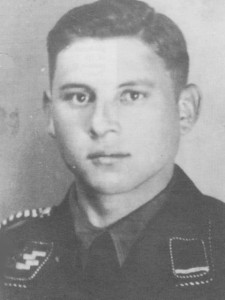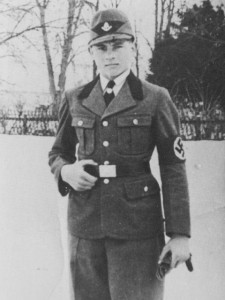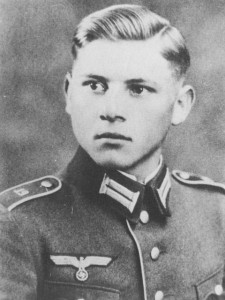Michael Wittmann, the man who would go on to become one of the greatest exponents of tank warfare in the Second World War – if not of all time – was born on 22nd April 1914 in the small village of Vogelthal, Landkreis Beilngries in the Oberpfalz region of Bavaria. The first-born son of local farmer and trader Johann Wittmann and his wife Ursula (née Lachermayer), the young Michael was, like the majority in the region, baptised and raised as a Catholic.
The population of Vogelthal numbered only around 120, and the Wittmanns were a well-known and established farming family. Like his father, Michael Wittmann’s grandfather, also called Johann, had also been a farmer. It was a well-ordered life that offered a pleasant idyll as a payoff for hard work, and the young Michael would have a fairly ordinary and happy early life along with his younger brother Johann Jr. and three sisters, Franziska, Anni and Theresa.
Like many others of his age at the time, Michael Wittmann attended his local elementary and secondary school before joining his father and brother in the day to day running and management of the family business, which was far from easy in what were uncomfortable and unpredictable times for many Germans.
While Michael’s father was able to keep a job, it was becoming increasingly difficult. During the 1920s he had bought and sold several farms, moving from Vogelthal to a succession of different towns and villages in the area. When Michael finished his obligatory schooling in 1930 at the age of sixteen, he went to work on the farm.
Early times on the Farm
It was on the farm where the young Michael developed the skills which were to assist him greatly in his later life – the concept of applying hard work and effort to the task in hand, the importance of teamwork, and, particularly from his father, a thorough knowledge of the various types of tools and machinery used on the farm. The young Michael’s affinity with mechanical things and his close attention to detail would play a significant role in the later development of his career.
In addition, Michael’s hunting instinct – which was also to serve him well in his later career – was honed to perfection by his early introduction to game hunting, a task which at first presented something of a barrier to the young Michael as a result of his deep love of animals and nature in general. Nevertheless, such skills were essential in order to guarantee the family meal being on the table, particularly during the lean times of financial austerity.
Times were tough as the German economy continued to struggle, and in December 1932 Johann Wittmann moved away from his family to the nearby city of Ingolstadt with Johann Jr., who had trained to be a baker. Johann had by this time given up on his life as a farmer. Having spent a short time doubling up as an innkeeper in the small village of Höhenberg near Neumarkt in der Oberpfalz, he moved to the city of Ingolstadt to take up a role first as a warehouse operative and then as a factory worker.(1)
Michael Wittmann remained at the family farm with his mother and younger siblings until the summer of 1933, but by this time already knew that the life of a farmer was never going be for him. He had managed to secure a job at a local dairy in the late summer and autumn of 1933, but this would only last for three months before he was on the move again. Not long afterwards his mother also left the farm, moving back to her home town of Marschall near Holzkirchen.
Life with the Reichsarbeitsdienst
Michael Wittmann had lived a somewhat nomadic life after leaving the family farm in 1933, but a year and a day after the accession to power of Adolf Hitler, the nineteen year old’s fairly ordinary existence would change markedly.
On 1st February 1934, Wittmann made the decision to do his bit for the Fatherland – as many at the time were doing – by joining the Benediktbeuren branch of the Volunteer Labour Service (Freiwillige Arbeitsdienst, or FAD). The FAD, like many similar organisations sprouting up in Germany at the time, placed a great deal of emphasis on co-operation and teamwork. The combination of his practical work experience and can-do attitude meant that Wittmann fitted right in.
The FAD had originally been established in 1931 during the Weimar Republic by then Chancellor Heinrich Brüning to provide and manage labour services for civic and land improvement projects, and following the Nazi seizure of power it was seen as the perfect vehicle to mobilise – and more crucially militarise – the labour force. The FAD became the RAD (Reichs Arbeitsdienst, or Reich Labour Service) in July 1934, but by the time Wittmann had joined it had already been transformed into an effective and well-organised paramilitary organisation.
It was during this period when Michael Wittmann finally made the decision not to pursue a career in agriculture, and like many others he had met during his six months’ service with the RAD he decided to volunteer for the rejuvenated German military – recently released from the yoke of Versailles. On 30th October 1934 the twenty year old Wittmann signed up for a two-year period of service in the Army, and was assigned to 10. Kompanie of the 19th Infantry Regiment based at the Arnulf Barracks in the Bavarian town of Freising near Munich.
A New Beginning in Freising
Although military life was something new to him, Wittmann adapted quickly to this new community and environment. Once again, the idea of co-operation and teamwork was high on the agenda, although of course the stakes were somewhat higher. Alongside this came the incessant drills and regimented early-morning musters, which helped transform Wittmann and his colleagues from green-around-the-gills recruits to highly motivated, physically fit individuals – and, when all of these things were brought together – into a highly effective and organised fighting force. Many tasks had to be performed repeatedly during training, over and again until the required standards were met.
It was during this initial training where Wittmann encountered a Panzer for the first time, the fledgling Panzerkampfwagen I. Like many of his fellow trainees, Wittmann was instantly fascinated by the metal monster, although as a piece of equipment it was very similar to the farm machinery that he had worked closely with along with his father and brother. It was here that he would learn a number of infantry Panzer-busting techniques, as well as about the vehicle’s many strengths and weaknesses.
Wittmann remained with 10. Kompanie until the end of his two-year stint in September 1936, reaching the rank of Gefreiter before his being honourably discharged. During this time he had relocated to Ingolstadt on the recommendation of his father, and in the following month had found temporary work as a railway construction worker in the nearby town of Reichertshofen. By this time however he had become interested in pursuing a career in the Allgemeine-SS, an organisation that offered a number of benefits, not least of which was the rather attractive black uniform.
On 1st October, Wittmann joined the ever-growing list of applicants by applying to his local SS unit. Meanwhile, his somewhat nomadic life continued as he moved from one bedsit to the next in Ingolstadt. Since leaving home he had been unable to settle down, with only the Army providing any sort of stability.
Still fresh from his two years’ Army service, the twenty-two year old Wittmann would have no trouble whatsoever in passing the necessary physical requirements for joining the Allgemeine-SS. A mere month after presenting his application as a candidate, he was assigned to Sturm 1/92 of the Allgemeine-SS, stationed in Ingolstadt and given the SS number 311623.
Despite being back in uniform Wittmann would once again get itchy feet. The Allgemeine-SS was certainly a step up from being a farmer, manual worker or dairyman, but the mundane administrative tasks assigned to him did not appeal in the slightest. His time in the Army had fired an enthusiasm for being a “proper” soldier as opposed to a ceremonial pen-pusher.
Luckily, Wittmann did not have to look very far in seeking out a new career path. The diversification of the SS organisation had already begun in earnest following the decline of the paramilitary Sturmabteilung (SA) in the mid-1930s, and with it came the formation of a new military wing, the SS-Verfugungstruppe or SS-VT – which would later become the core of the expanded Waffen-SS.
Michael Wittmann’s early life on the farm had provided him with solid working experience, and while he remained a thoughtful and and times sensitive soul there was an inner steel, strengthened by his service in both the FAD/RAD and the Army. While confident in his own abilities, Wittmann was at the same time both grounded and patient. He had continually shown a willingness to learn combined with a quiet and determined ability to do his job, taking pride in his work without making a show of it. He was the perfect candidate for the SS-VT.
The Beginning of a new Career
Unlike the Allgemeine-SS, the initial training for the SS-VT was tough, with all of the new candidates having to pass a number of demanding physical and medical tests. Standards were excruciatingly high, and a good number of otherwise decent candidates fell by the wayside. Confident in his abilities and using his previous military experience, Wittmann aimed high. On 5th April 1937, less than six months after his initial application, he was accepted as a recruit with 17. Kompanie of the élite Leibstandarte SS Adolf Hitler.
Acceptance into the Leibstandarte saw Michael Wittmann embark on what was the first part of a new adventure, leaving Bavaria for the first time just four days after his being accepted. On 9th April the young recruit left the familiar comforts Ingolstadt for the bright lights of Berlin, where he joined the company in training at the famous Lichterfelde Barracks located in the south of the city. He was thirteen days short of his twenty-third birthday.
The Leibstandarte SS Adolf Hitler – often abbreviated to LSSAH or LAH – was the premier SS-VT division, its historical foundation being Hitler’s personal bodyguard detachment, the Stosstrupp Adolf Hitler, which had been created by Josef “Sepp” Dietrich in the early 1920s. Accordingly, recruitment standards – which placed a great deal of emphasis on physical attributes and the provision of appropriate ancestral documentation – were considerably higher than the Allgemeine-SS or for any of the other newly-formed SS-VT or Waffen-SS units.
Many, including divisional commander Dietrich himself, had complained bitterly about these rules – many of which bordered on the ridiculous. For example, if the 1.76m tall Michael Wittmann had attempted to join at any later stage, he would have been refused entry on grounds of his height.
On joining the LSSAH, Wittmann was given the rank of SS-Mann – the SS equivalent of his former Wehrmacht rank of Gefreiter. His initial training would be as an armoured car crewman, and as part of this training he would be introduced to a number of armoured reconnaissance vehicles, including the four-wheeled Sd. Kfz. 222 Leichter Panzerspähwagen and six-wheeled Sd. Kfz. 232 Schwerer Panzerspähwagen.
Wittmann’s commanders in the 17. Kompanie included names that would become famous in their own right in later years as highly decorated officers, including future Knight’s Cross winners Max Wünsche and later Erich Olboeter. It would soon become clear that the Leibstandarte was not just any military formation.
Life in the Leibstandarte covered more than just the military training. 17. Kompanie would also have to perform their ceremonial obligations, which included regular parades, guard duties and attending the visits of foreign dignitaries. When Italian leader Benito Mussolini arrived in Berlin in September 1937, Wittmann and his colleagues were assigned to the provide security detail at the railway station.(2)
Wittmann’s first campaigns
On 9th November 1937 Wittmann attended the official swearing in ceremony at the Feldherrnhalle in Munich, and at the same time was promoted to the rank of SS-Sturmmann. In March the following year his armoured company joined the rest of the LSSAH in the march into Austria following its incorporation into the Reich, and less than eight months later the LSSAH was leading German troops into the disputed Sudetenland region in Czechoslovakia. For his part in both of these two operations the young Wittmann received the first two of his many decorations.
It was not all glory and awards, however. During the Sudetenland campaign Wittmann was involved in an accident resulting in neck and back injuries.(3)
Sometime in March 1938 Wittmann became a member of the NSDAP, an event that doesn’t appear to have made much of an impact on his career. There is no evidence to support the idea that Wittmann was ever an enthusiastic National Socialist, and his acquiring party membership almost a year after joining the Leibstandarte suggests that it was little more than an administrative rubber stamp exercise. There appears to be no other reason for Wittmann’s membership other than it was probably expected of every member of the SS; he was given the membership number 5508244.(4)

On 20th April 1939, Hitler’s fiftieth birthday, Wittmann was promoted to the rank of SS-Unterscharführer. There is no apparent record of his ever being assigned the rank of SS-Rottenführer, so the only assumption one can make is that he had been promoted by two grades.
The newly-promoted NCO would take part in more training exercises during the summer of 1939 as things returned to normal, but elsewhere in Europe things had started to stir. Before long, Michael Wittmann was right back in the thick of the action.


